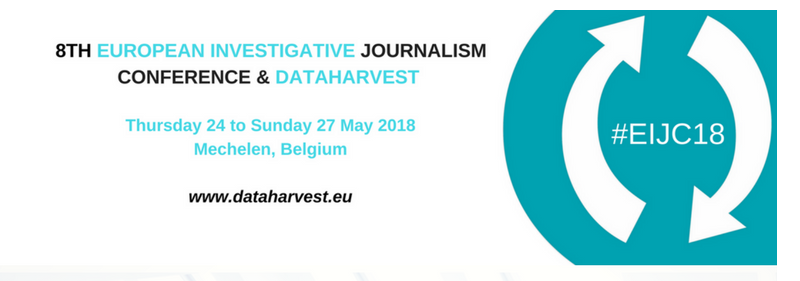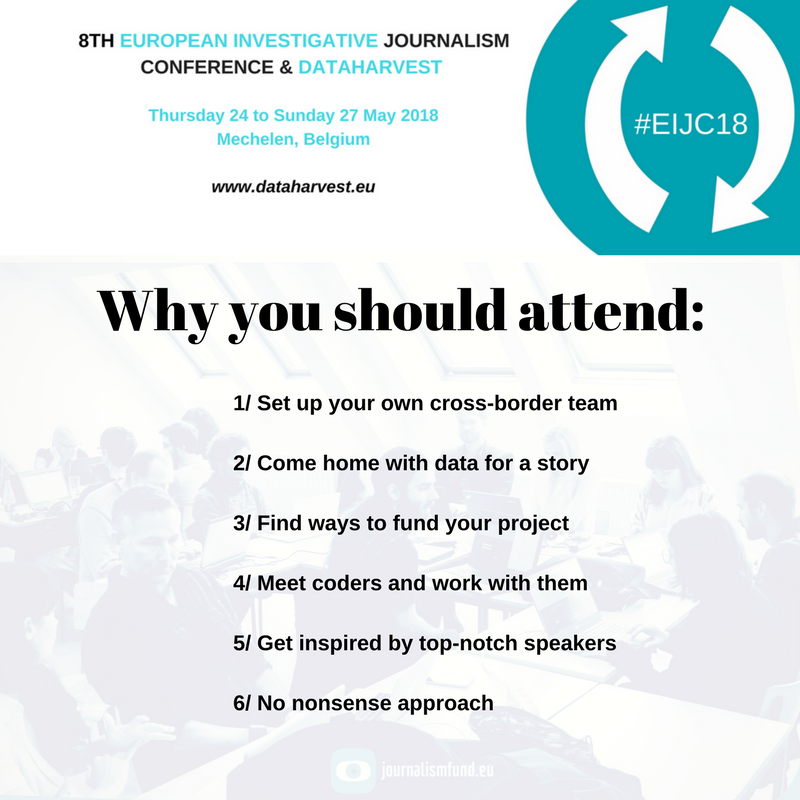EIJC18 & Dataharvest in May 2018

 The 8th European Investigative Journalism Conference & Dataharvest will be held from May 24th to 27th 2018 in Mechelen near Brussels.
The 8th European Investigative Journalism Conference & Dataharvest will be held from May 24th to 27th 2018 in Mechelen near Brussels.#EIJC18 & Dataharvest offers hugely inspiring investigative journalism cases, ample opportunities to meet interesting colleagues and coders, and tons of training sessions to brush up your skills hands-on. Check out our programme outline. This is the one conference you do not want to miss!
Register now and take advantage of our early bird rates. Deadline 28th of February.
Programme
Bringing journalism into a new era
The very role of journalism in society is being challenged. The Dutch journalist Joris Luyendijk is among the most courageous and persistent of those challenging journalism’s routine ways of thinking and doing. He is often spoken of as among the most visionary journalists of this challenging time by – for example – Allan Rusbridger, the Guardian’s editor in chief for 20 years. Joris Luyendijk will talk about rethinking and redoing journalism in the Friday keynote and selected presentations. Read more
Connecting the dots: Local journalism goes crossborder
Local investigative journalism is entering a new era. Gaining new self-confidence and momentum and making use of the opportunities of the digital age , local investigative journalism is proving to be an excellent way of giving citizens a voice. However, if local voices want to be heard and lead to genuine change, they need to speak up at the European level. At the EIJC & Dataharvest 2018 we bring together local journalism initiatives from all over the continent to collaborate on shared topics. The objective is loud and clear: Cross-border local journalism will make citizens’ voices heard at the European political level through networking. Read more
Collaborative journalism: Crossborder journalism
Major cross-border projects have been published this year again and excellent and actual cases will be presented. In the cross-border track we’ll offer a step-by-step introduction for beginners along with a high level of nerdiness when it comes to this swiftly developing journalism practice: Journalistic method from research to publication, legal, ethical and technical challenges and editorial coordination. We will also reach out to academic researchers. Read more
Collaborative journalism: Scientists and journalists collaborating in the public interest
Collaborative journalism is growing, as exemplified by a new coequal approach by journalists and scientists. Impressive examples from all over the world are inspiring progress in this field. For this track we gather pioneers in the field from science, journalism teams that have tried and scholars with practical and theoretical experience studying this new phenomenon. More to come soon.
Security and whistleblowing
Journalists’ duty to make sure that confidential sources are protected is as important as ever in both the digital and the real world. Whistleblowing, source protection, risk assessment, journalists’ safety, digital self-defence and criminalisation of journalists will be part of this track. Read more
Freedom of Information
The EIJC & Dataharvest is the place in Europe for journalists to meet and work with freedom of information methodology. Teams behind prominent cases like the MEP-project met here, teaching and training of freedom of information practice has been a standard for years – and is no less important now. Come and be part of this constantly revitalising network.
Algorithm accountability
At #EIJC&Dataharvest 2017 we put algorithmic accountability reporting on the agenda of European journalists with a key-note presentation by the hugely inspiring Nicholas Diakopoulos (University of Maryland), followed by a workshop and a roundtable discussing pressing questions related to the topic. In 2018 we team up with the colleagues from AlgorithmWatch to look at some European algorithm accountability investigations and develop ideas to further advance the field. Read more.
Methods of investigative journalism
With all the attention on new methods such as data- and cross-border journalism we should not forget the classic methods of the profession such as in-depth interviews, fact-checking and ‘bullet-proofing’ your findings before publication or preparing your findings for publication in order to bring societally important topics and cases to the attention of the public and those in power.
Story-telling and much more – how to present investigative findings
Satire; visualisation; news games, adapting cross-border findings to multiple target groups: The need to understand, adapt and practice ways to present the findings of our journalistic research appears more necessary than for a long time. In this track we look into the differences in presenting shared findings from cross-border journalism teams to a variety of audiences, we see whether we can learn from other professions.
Fresh data
As always there will be fresh data sets to take home to your job. During the Dataharvest hack day on the 24th of May the volunteer data developers and data journalists will prepare data sets and data tools and present them during the conference days May 25th-27th. Also, representatives of public authorities and organisations holding international data sets will join the conference to present and explain their data. Networking moments will then allow you to not only bring home fresh data but also contacts from other countries to work with.
Data journalism & Computer Assisted Reporting (CAR) including systematic training
As every year, the European Investigative Journalism Conference & Dataharvest presents fresh inspiration on data journalism and CAR projects including investigations, analysis and presentations. Either with a strong European / global focus or with a methodology aspect capable of inspiring others. And as in the past two years, the European Investigative Journalism Conference & Dataharvest will present a thorough training program on data journalism and computer assisted reporting.
Entrepreneurial journalism & funding
Are you looking for inspiration for new models? Do you want to gain experience in pitching stories, writing applications or writing business plans? Do you want to meet donors and understand the why and how? Read more.
The thematic approach
Agenda-setting and impressive investigations occur all the time. At the EIJC & Dataharvest 2018 we will focus on a number of topics. Stay tuned!
Throughout: Networking
Networking opportunities will be carefully built in throughout the programme – be that working rooms, networking moderators or surprise networking pop-ups. All of course in charming Mechelen, where during the two days of the EIJC you’ll hardly be able to walk into a resto or a pub without bumping into a conference colleague.






